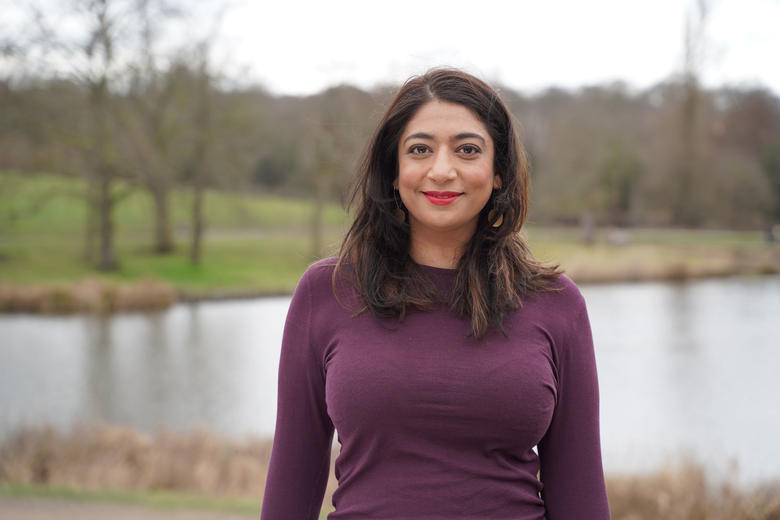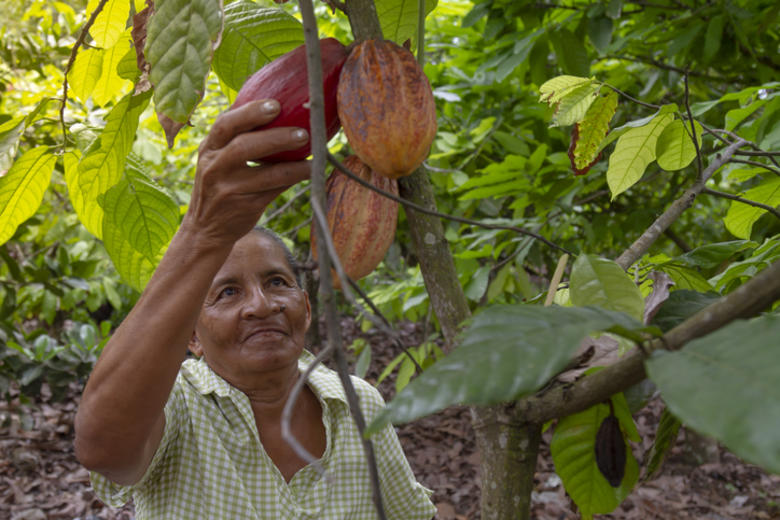BEWARE THE LOVE OF THE IN-GROUP

BEWARE THE LOVE OF THE IN-GROUP
Julia Ebner discusses her current research on violent political extremism
Published: 28 October 2024
Author: Richard Lofthouse
Share this article
The serenity of the setting for our discussion – Magdalen College SCR – seems wildly at odds with scenes from Dr Ebner’s (St John’s College, 2019) previous books where she went underground as a researcher, to mix it up with political extremists and find out what made them tick.
On one occasion she wore Adidas trainers to a Trump rally only to be reminded, to her horror, that everyone present wore New Balance, on account of one of former US President Trump’s preferences following a spat; in another she went on a blind date with an identitarian who quickly made plain that he was planning for four children, must be white.
That was in Going Dark: The Secret Social Lives of Extremists (2020). Her current book, published last year, is Going Mainstream: Why extreme ideas are spreading, and what we can do about it.
It leads to a bald starter question, to what extent the COVID pandemic had an impact on extremism, because chronologically it floats exactly in the middle of two phases of her research.
‘Oh, very important. It [COVID] widened the audience for conspiracy myths; and fuelled grievances, fears and general mistrust in science and previously established centrists in politics and journalism.’
She draws on Adam Tooze’s phrase ‘polycrisis,’ because that’s what the pandemic in combination with the economic crisis amounted to. It was a crisis right across global society that for several months had no solution. By the time a vaccine came there was an extensive global population who were suspicious of it. Social media and technology, backgrounded by lock-downs and social isolation, fanned the flames in a way that was unprecedented in human history. The polycrisis was subsequently further exacerbated by the international security crisis triggered by the wars in Ukraine and the Middle East.
Three years after the last lock down, ideas such as ‘remigration’, a euphemism for mass deportation of unwanted or illegal immigrants that came out of the identitarian movement, have somehow morphed their way into the mainstream and are no longer seen as shocking to many citizens.
But that broad truth leads us directly to Dr Ebner’s current project in collaboration with Professor Harvey Whitehouse (Oxford, Anthropology) at Magdalen’s Calleva Centre for Evolution and Human Science. The aim of the project, working title ‘When Despots Become Deadly’, is to study the problem from its leadership apex as well as its interaction with the populistic base.
The broad insight is that what used to be external extremist groups – Dr Ebner’s first serious research around 2014/5 coincided with the rise of ISIS – has now become state sanctioned and makes the study of political leaders more important. The results are, in some cases, extreme violence, mass killing and genocide.
Her research for this project considers most large-scale, past genocides and mass killings from the twentieth-century onwards, beginning with the Armenian genocide in World War One, also taking in Hitler and the Holocaust, Stalin’s Russia, Cambodia, Rwanda, Bosnia, Chile under Pinochet, Gambia, Chad and Sudan. For our own present the research continues with examinations of leaders in Gaza, Israel, Russia, North Korea, Iran and several other countries that may be at higher risk of using extreme violence against civilians.
‘Even though the pathways, nature and scale of the historic state-sponsored atrocities vary, our hypothesis is that the leaders behind them share psychological patterns.’
She remarks on the evergreen insight of Mark Twain, about history not repeating itself but rhyming.
If it all sounds too enormous, or perhaps too conceptual to do justice to what was particular to each time and place, the merit of the research approach is that it actually starts to crunch the language and speeches of these many ideologies and leaders using what is called computational linguistic analysis.
‘AI is starting to inform our approach. We are trying to analyse vast datasets of language to parse the deadly cocktail into its ingredients and ultimately, to figure out where the real danger sits, to isolate the needle in the haystack – in some scenarios to help intelligence agencies to know which extremist groups to be really worried about but also to inform risk assessment in that larger, state-led context.
In one journal article, Ebner with her co-authors asks: 'Can we predict on the basis of the language used in manifestos which ones are likely to be followed by acts of murderous self-sacrifice and which ones can be safely ignored?'
I ask where Nigel Farage would fit into this framework.
She says that his rhetoric contains some – but not all the ingredients – for elevated risk. This is true for many of today’s far right, far-left and Islamist political movements. Based on Dr Ebner’s previous doctoral research and statistical analysis of the communication materials of perpetrators of terrorism and non-violent control groups, violence risk can be assessed based on four main vectors: a systematic out-grouping of an enemy, which is duly demonised or de-humanised; existential threat; violence-condoning norms and identity fusion (a phenomenon whereby the personal and group identities of an individual become one).
The final, fourth category is very important says Dr Ebner, more important than perhaps we have realised.
‘The intense love of the in-group, where individuals are highly fused together in their identities, is likely the more powerful element in what might lead them to commit violent acts, than the hatred of the outgroup,’ she says.
What creates the most powerful cases of identity fusion is unfortunately part of the broader cycle of violence, where for example there is a mass trauma and dysphoric experiences that are shared with one’s ingroup – something that applies to both opposing sides in Gaza/Israel.
For very large numbers of other cult-like or fringe groups, such as QAnon who spread conspiracy myths and exploded in size during the pandemic, they typically have some of the elements of identity fusion but nowhere near the degree to which it comes to bear if there is a mass trauma, or a compound of shared dysphoria and biological kinship.
‘One of the points we try to get across is that these group bonds are real. There is another view that says, ‘if only we can teach critical thinking and digital literacy, no one will fall for the weird theory or go down the radicalisation rabbit hole. But our research shows that the group cohesion and social dynamics often matter more than ideological indoctrination, and can contribute to ‘cumulative radicalisation’ that affect wider parts of populations. A good example is the white nationalist Generation Identity movement which has successfully mobilised highly educated people. Political extremism is no longer on the fringe or confined to socio-economically marginal groups.’
With a terrific score sheet of dual Bachelor and Masters degrees that included living in Peking and learning Mandarin, Dr Ebner came to Oxford in 2019 and completed a DPhil in Anthropology, which seems entirely appropriate given that she is studying humans for deadly behaviour towards each other that modernity and ‘civilisation’ was supposed to have eliminated.
She says that living in Peking and learning Mandarin taught her the importance of empathy to an entirely different viewpoint. We might have brushed the Opium Wars under the imperial carpet, she reminds me, but every Chinese school child is taught extensively about what the Chinese refer to as ‘The Century of Humiliation.’
She is presently a Postdoctoral Researcher at the Calleva Centre for Evolution and Human Science at University of Oxford (Magdalen College), the Leader of the Violent Extremism Lab at Oxford's Centre for the Study of Social Cohesion and a Senior Research Fellow at the Institute for Strategic Dialogue (ISD), where she has led projects on online radicalisation, terrorism, conspiracy myths and hatespeech.
In late-October she won the ‘International Success’ category of the annual awards "Austrians of the Year" awarded jointly by the Austrian daily newspaper Die Presse and the Austrian Foreign Ministry.
The attempt to create a live, linguistic tool that can potentially discern patterns of language that grade the risk of different groups or populations has resulted in much interest from intelligence agencies who in most cases are overwhelmed with real and imagined threats and painstaking case work and cyberdefence.
Ebner is also in great demand from media organisations, and having been born in Vienna and grown up partly in Austria, she has written eloquently about the victory of the far-right Freedom Party (FPÖ) in Austria’s recent general election, for instance noting that the hyper-nationalism of such movements is actually, and contradictorily, a shared, international idea.
Dr Julia Ebner is a Postdoctoral Researcher at the Calleva Centre for Evolution and Human Science at University of Oxford (Magdalen College), the Leader of the Violent Extremism Lab at Oxford's Centre for the Study of Social Cohesion and a Senior Research Fellow at the Institute for Strategic Dialogue (ISD), where she has led projects on online radicalisation, terrorism, conspiracy myths and hatespeech. Based on her research, she has given evidence to numerous governments, as well as advised intelligence agencies, tech firms and international organisations such as the UN, Europol and NATO. Julia is also an award-winning and internationally bestselling author of several books, including The Rage: The Vicious Circle of Islamist and Far-Right Extremism, Going Dark: The Secret Social Lives of Extremists and Going Mainstream: How Extremists Are Taking Over. She has written for media outlets such as the Guardian, Financial Times, Washington Post and Süddeutsche Zeitung and regularly gives public talks and guest lectures at universities in the UK, Europe and the United States. Julia holds a DPhil in Anthropology from the University of Oxford and a dual Msc from Peking University and the London School of Economics.















